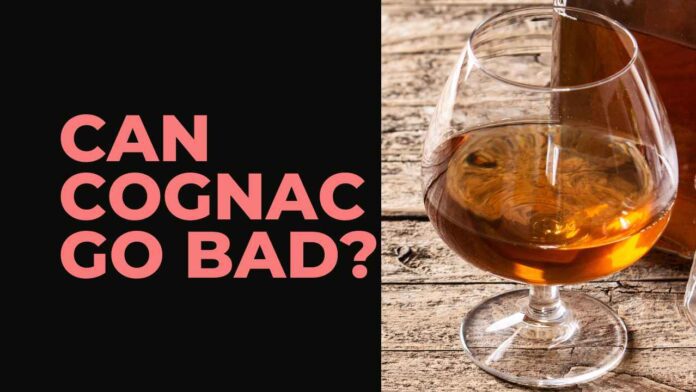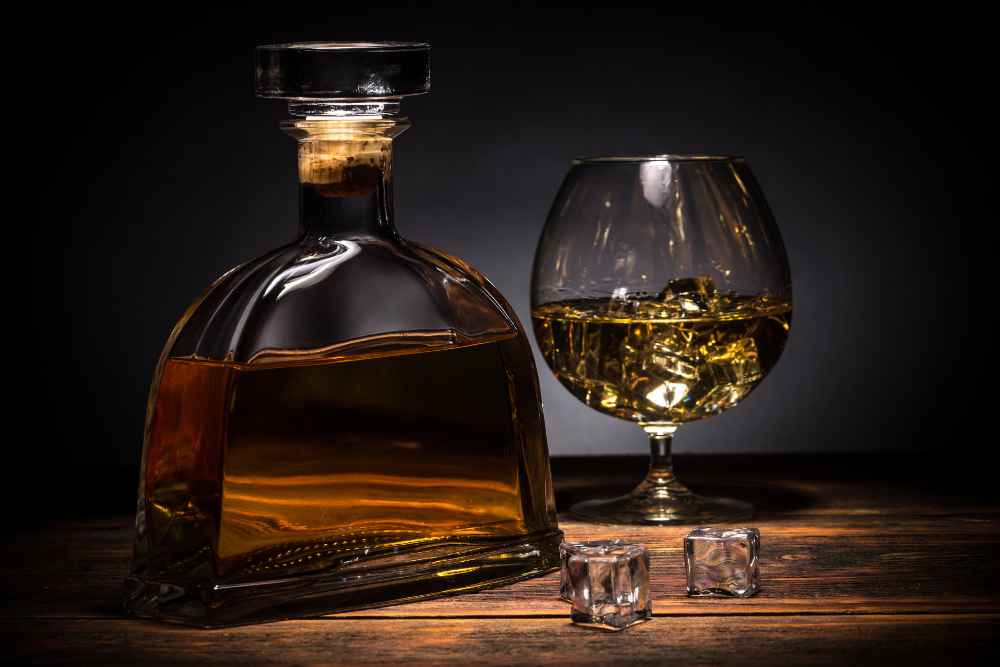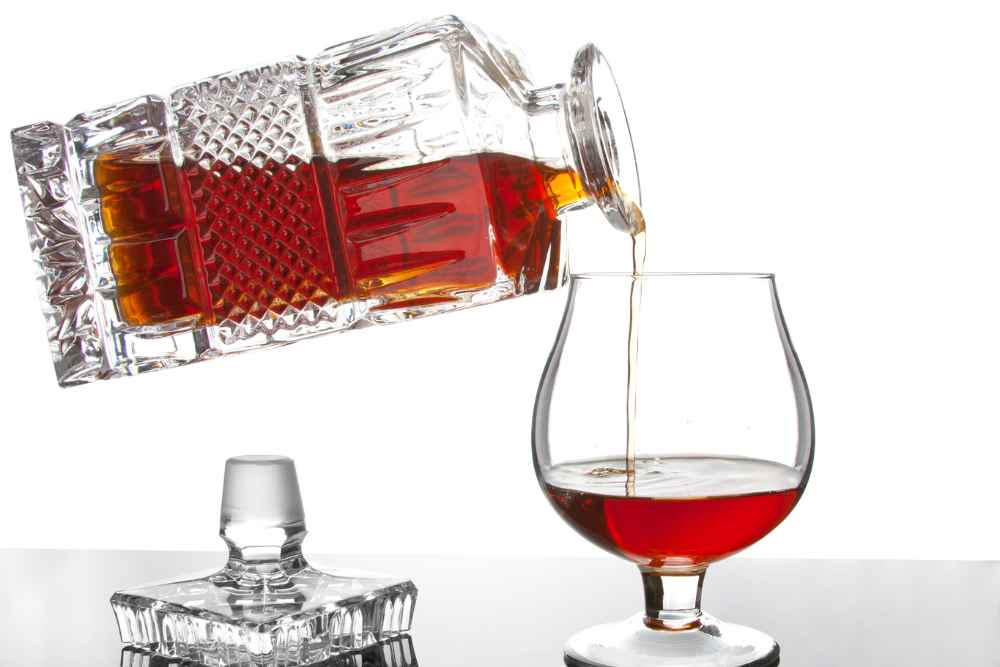This page may contain affiliate links. Please see our Disclaimer for more information. Always drink responsibly and adhere to your local legal drinking age.
Introduction
Cognac, a luxurious and timeless spirit enjoyed by connoisseurs worldwide, often raises the question: Can it go bad? As you savor each sip from your glass of this exquisite drink, it’s crucial to understand its shelf life and how to store it properly.
In this comprehensive guide, we’ll delve into the rich history of cognac production, analyze factors influencing its longevity, unveil signs that indicate your cognac may have gone bad, and provide expert tips for maximizing its exquisite taste over time.
Key Takeaways:
- Unopened cognac bottles can last indefinitely when stored correctly in cool, dark places away from light and heat sources.
- Proper storage techniques are crucial for maintaining the quality and longevity of your cognac, such as choosing the right location with consistent temperature and humidity levels, using good-quality corks/seals, and storing upright to prevent air exposure.
- Signs that indicate a bottle of cognac has gone bad include discoloration or cloudiness, off odors/flavors like musty or moldy smells, changes in texture/consistency (e.g., thicker/syrupy), or sediment at the bottom of the bottle.
- Exposure to light, air, and heat, as well as improper storage conditions, can affect cognac’s shelf life; thus, it is essential to choose a cool/dry place out of direct sunlight, keep corks/seals new & well-maintained without visible cracks/damage for tightness sealing up against necks.
Understanding Cognac: History, Production, And Shelf Life
Cognac is a type of brandy that originates from the Cognac region of France and is made from specific types of grapes that are double-distilled and aged in oak barrels for at least two years.
The Distinctive Characteristics Of Cognac
Cognac is a unique and highly sought-after type of brandy that hails from the Cognac region in France. Made exclusively from white wine grapes, this exquisite spirit boasts an array of distinctive characteristics that set it apart from other brandies on the market.
One defining feature is its meticulous production process, which involves double-distillation in copper pot stills and aging in oak casks for a minimum of two years.
The allure of Cognac extends beyond its exceptional taste; its storied history plays a significant role as well. Dating back to the 17th century, early distillations were explicitly designed for exportation, catering to far-reaching European ports and discerning consumers abroad – including avid fans among American and Chinese markets today.
The Aging Process And Shelf Life Of Cognac
The aging process is an essential component of what makes Cognac so unique and enjoyable. According to AOC rules, Cognac must be aged for a minimum of two years in oak wood barrels before it can officially be considered as such.
The interaction between the spirit and the oak lends distinct flavors, aromas, and complexities that continue to develop over time.
Regarding shelf life, unopened bottles of Cognac are known for their remarkable longevity – they can last indefinitely due to their high alcohol percentage. This means that you could potentially discover an old bottle tucked away in a cellar somewhere, dust it off, and enjoy its rich flavor profile even after decades have passed! However, once opened, Cognacs should ideally be consumed within a few months to ensure optimal taste.
Properly stored bottles can maintain their quality for up to four to six years or even longer in some cases.
How Long Can An Unopened Bottle Of Cognac Last?
An unopened bottle of cognac boasts an impressive shelf life, potentially lasting indefinitely when stored properly. This makes it a fantastic addition to any cocktail lover’s collection, as you won’t have to worry about spoilage or degradation in quality if left untouched for years.
To ensure your cognac’s longevity, store the unopened bottle in a cool, dark place away from any light or heat sources. The absence of these elements will prevent evaporation and safeguard the intricate flavors within the bottle.
For instance, consider keeping your prized possession stashed in a cabinet or dedicated liquor storage area where temperature and humidity levels are consistent and controlled.
How Long Will An Opened Bottle Of Cognac Last?
Once opened, a bottle of cognac will last for a few months to maintain its best quality. This is because oxidation occurs when the liquor comes into contact with air after the seal is broken and can lead to changes in flavor over time.
However, once again, properly storing an opened bottle can extend its lifespan. Keeping it tightly sealed and away from direct sunlight or heat sources will ensure the cognac remains drinkable for up to two years without losing too much of its distinctive aroma and taste.
Signs Your Cognac Has Gone Bad
If you notice discoloration, off odors or flavors, or changes in texture or consistency when pouring yourself a glass of cognac, it may have gone bad.
Discoloration Or Cloudiness
If you notice any discoloration or cloudiness in your cognac, it may be a sign that it has gone bad due to oxidation. This can happen when the cognac is exposed to too much air or sunlight, causing it to degrade and lose flavor.
Proper storage techniques, such as keeping the bottle away from direct sunlight and ensuring a good seal on the cork, can help prevent this. However, if you do see any noticeable changes in appearance or texture, there is a chance that your cognac may have spoiled and should not be consumed.
Remember that improper storage can expose your cognac to air, heat, and oxygen, causing spoilage over time.
Off Odors Or Flavors
If you notice a musty or moldy smell emanating from your cognac bottle, it’s a clear sign that something has gone wrong. Other off-odors to watch out for include vinegar, nail polish remover, or rotten fruit.
Similarly, if the flavor of your cognac seems off and doesn’t meet your expectations, it may have turned bad. Remember that taste is subjective and can depend on various factors, such as storage methods and personal preferences.
Changes In Texture Or Consistency
If you notice that your Cognac has become thicker or more syrupy in texture, this may indicate that it has gone bad. Additionally, any sediment at the bottom of the bottle can be a warning sign.
Another change to look out for is if your Cognac appears cloudy or hazy instead of clear.
It’s essential to keep your Cognac stored properly in order to avoid these issues. Storing your bottle upright, away from direct sunlight and heat sources, can help prevent it from going bad too quickly.
If you notice changes in texture or consistency, it’s best not to drink it as it might taste off and lose its intended flavor profile.
Factors Affecting Cognac Longevity
Factors such as exposure to light, air, and heat, storage temperature and humidity, and cork quality can significantly affect cognac longevity.
Exposure To Light, Air, And Heat
Exposure to light, air, and heat can severely affect the longevity of your cognac, causing it to spoil quicker than you might expect. When cognac is exposed to sunlight for prolonged periods, it can change its color and flavor profile over time.
To keep your cognac fresh for as long as possible, store it in a cool and dry place, away from direct sunlight or any significant temperature changes like those found in the kitchen or near windows.
Consider investing in specialized Cognac storage containers to protect your spirit from harmful exposure.
Storage Temperature And Humidity
Storage temperature and humidity levels are crucial to maximize the shelf life of cognac. Cognac needs to be stored at cool temperatures between 10-16°C and humidity levels of 60-70%.
High temperatures can cause evaporation of the alcohol content in your cognac, while low humidity levels can affect the seal on your bottle’s cork, exposing it to air and oxidation.
Improper storage conditions can also negatively affect your cognac’s flavor profile and aroma.
Quality Of Cork And Seal
The quality of the cork and seal is crucial in determining how long your cognac can last. A poor-quality cork can allow air to enter the bottle, leading to oxidation and evaporation that can quickly degrade the flavor of your drink.
Corks should be new or well-maintained, with no visible signs of cracks or damage. Additionally, the tightness of the seal between the cork and bottleneck plays a significant role in preserving your cognac’s quality over time.
Proper Storage Techniques For Cognac
Proper storage techniques are crucial for maintaining the quality and longevity of your cognac.
Choosing The Right Storage Location
When storing your precious bottle of cognac, the location you choose is essential. Always look for a dark and cool place with a consistent temperature that won’t fluctuate too much.
A closet or cabinet away from direct sunlight would be perfect. Avoid areas near radiators, ovens, or windowsills where the temperature changes frequently. If you have multiple bottles of different spirits in storage, make sure they are not touching as this can affect their flavor over time.
It’s also essential to consider humidity levels when selecting your storage location; high humidity can cause evaporation or dilution of alcohol content, while low humidity may dry out and degrade the cork seal around the neck of your bottle, significantly affecting the quality of its contents.
Storing Your Cognac Upright Or Laying Flat
How you store your cognac can significantly impact its longevity and taste. When storing your bottles, experts suggest that you keep them upright instead of laying them flat.
Keeping your bottle upright also helps minimize oxidation since there will be less surface area exposed to oxygen than if the bottle were laid flat.
Proper storage techniques, such as maintaining consistent temperature and humidity levels, are essential to ensure your cognac maintains its quality over time.
Keeping Your Cognac Away From Direct Sunlight
When storing your cognac, one of the most important things to keep in mind is keeping it away from direct sunlight. Exposure to UV rays can cause the alcohol inside the bottle to break down and oxidize, changing taste and quality.
To prevent this, store your cognac bottles upright in a cool, dry place away from direct heat or light sources. Consider using a cupboard or cabinet with solid doors that won’t let any light inside.
Another option is covering your bottles with cloth or paper materials to protect them from light exposure further.
Maintaining Consistent Temperatures And Humidity
Proper cognac storage requires maintaining consistent temperatures and humidity levels, as these factors play a crucial role in preserving the quality and flavor of the spirit.
Experts recommend storing cognac between 10-18°C (50 to 64°F) with humidity levels at 60-70%.
Storing cognac too warm can also lead to the evaporation of alcohol content, which results in less taste in the bottle. Therefore, it is essential to store your bottle upright in a cool and dry place away from direct sunlight.
Doing so allows you to maintain optimal storage conditions for your cognac while enabling it to develop complexity over time.
Tips For Maximizing Cognac Shelf Life
Understanding the aging process and vintage, proper cork placement and maintenance, using inert gas to preserve flavor, and avoiding mixing different cognacs are all essential tips for maximizing cognac shelf life.
Understanding The Aging Process And Vintage
To understand Cognac’s aging process and vintage, it’s essential to know that all Cognac is aged in oak barrels, where it gains its distinct flavors and color.
The longer a Cognac spends in the barrel, its flavor becomes more complex and balanced. While some Cognacs are aged for just 2 years before bottling, others spend decades maturing to perfection.
Vintage also plays a significant role in determining the quality of a bottle of Cognac. Vintage refers to the year when the grapes used to make the brandy were harvested, and each vintage can produce unique nuances in flavor due to weather patterns during that year’s growing season.
Aged bottles from exceptional vintages are usually marked with their year on the label and can be prized by collectors for their rarity and depth of flavor.
Proper Cork Placement And Maintenance
To ensure the longevity of your Cognac, properly storing it also involves providing an airtight seal. Cork placement and maintenance play key roles in achieving this.
It is recommended to change the cork every ten years to ensure a perfect seal that prevents oxidation and evaporation. Additionally, always ensure the bottle is stored upright to guarantee that the cork stays completely wet with liquid, maintaining its elasticity for an extended period.
Using Inert Gas To Preserve Flavor
Another way to maximize the shelf life of cognac is by using inert gas to protect it from oxidation and other harmful elements. One method is to use a wine preservation system that pumps argon or nitrogen gas into the bottle after opening, which displaces the oxygen inside and preserves the flavor.
Another simple solution is to use an aerosol spray canister filled with food-grade argon or nitrogen, which works by spraying a layer of inert gas on top of the cognac before recorking it.
Cognac connoisseurs swear by these methods as they help preserve the taste and aroma of their favorite drink. It’s worth noting that once opened, cognac will still undergo subtle changes over time – hence why many enthusiasts prefer consuming it gradually within weeks instead of months or years after opening.
Avoiding Mixing Different Cognacs
Mixing different cognacs may seem tempting, but it is generally not recommended. This is because each cognac has its unique taste and aroma profile, which can be affected when mixed with another type.
For example, mixing a young and light-bodied cognac with an older and wealthier variety can result in flavor imbalance or loss of complexity.
To fully appreciate the nuances of each bottle, it’s best to enjoy them separately rather than attempt to create a blend. That being said, some expert mixologists experiment with blending various cognacs for cocktails or as part of a food pairing experience.
Common Mistakes To Avoid
Avoid storing cognac in the refrigerator, exposing it to air and sunlight for too long, or freezing or heating it. These mistakes can degrade the quality of your cognac and affect its flavor and aroma.
Storing Cognac In The Refrigerator
Storing cognac in the refrigerator is a common mistake many people make. This can subdue the flavor and smooth character of the brandy and prevent it from being enjoyed to its fullest potential.
If you want to preserve the quality of your cognac, store it in a cool, dry place away from direct sunlight. Keeping it upright will help prevent evaporation and oxidation, which can change the taste over time.
Proper storage techniques, such as using an airtight container or decanter, can also help maintain its flavor for longer periods.
Overexposure To Air And Sunlight
Exposure to air and sunlight can also affect the quality and flavor of your cognac. Oxygen is an enemy of cognac, which will cause the alcohol content to evaporate slowly over time, altering its taste.
Meanwhile, direct sunlight can warm up the contents in a bottle of cognac and result in unpleasant off-flavors you do not want in your cocktail. It’s best to keep your cognac away from direct sunlight and store it in an area with little exposure to oxygen or heat.
Freezing Or Heating Cognac
It’s important to know that freezing or heating cognac can affect its flavor. Freezing can be safe, but it’s best to drink the cognac at room temperature to enjoy its taste fully.
Heating cognac is not recommended as it can drive off alcohol and destroy its delicate flavors. Proper storage in a cool, dry place away from direct sunlight is the key to maintaining the quality of your bottle of cognac.
Remember that even if your bottle of cognac has expired several years past its best-by date, proper storage will keep it drinkable for many more years to come.
FAQ
Q: Can cognac go bad?
A: Cognac is a spirit that can last for a very long time but can also go bad if not stored properly.
Q: How long does cognac last?
A: Cognac can last for years, even decades, as long as it’s stored in a cool, dark place, away from sunlight and heat.
Q: Does it matter if the bottle of cognac is opened or unopened?
A: Whether the bottle of cognac is opened or unopened, it can still go bad if not stored properly.
Q: How can I tell if cognac has gone bad?
A: If your cognac has an unusual or unpleasant odor or if it has changed color or taste, it may have gone bad.
Q: How do I keep cognac?
A: You can keep cognac in a cool, dark place, away from sunlight and heat. An unopened bottle can be stored for years, and an opened bottle can still be drinkable for several months or even years.
Q: Can old cognac still be good?
A: As long as it’s been appropriately stored, cognac can improve with age.
Q: Does cognac expire?
A: Cognac doesn’t expire, but it can lose its quality over time.
Q: What factors affect the life of cognac?
A: The quality of the cognac, the type of cognac, how the cognac is stored, and whether it’s been opened or unopened can all affect the life of cognac.
Q: Does cognac need to be refrigerated?
A: Cognac doesn’t need to be refrigerated but should be stored in a cool, dark place away from sunlight and heat.
Q: Will a bottle of cognac last forever?
A: A bottle of cognac can last for a long time, but the flavor may change over time, and the quality of the cognac may decline.
Conclusion: Enjoy Your Cognac Responsibly And Knowledgeably
In conclusion, understanding the shelf life of cognac is crucial to ensure you enjoy your favorite drink’s best flavor and quality. Remember, a properly stored bottle of cognac can last indefinitely without going bad.
However, check for any changes in color, odor, or taste before drinking an opened bottle that has been stored for over six months. Keep your cognac away from direct sunlight and store it in a cool and dry place at room temperature.





















